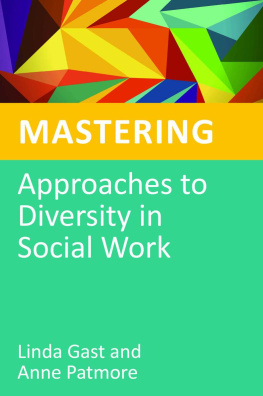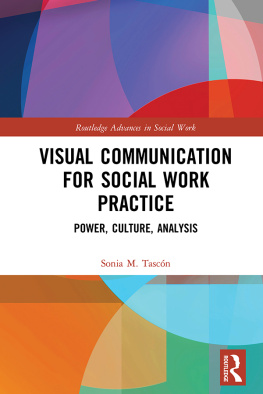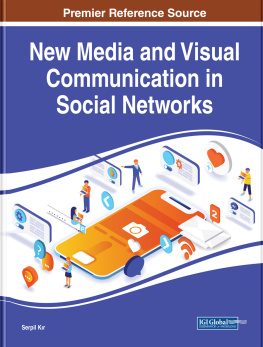Mastering Communication in Social Work
Mastering Social Work Skills series
Edited by Jane Wonnacott
This series of accessible books focuses on the everyday key skills that social workers need in order to practise effectively and ensure the best possible outcomes for service users. Easy to read and practical, the books feature key learning points, practice examples based on real-life situations, and exercises for the reader to enhance their learning. The books in this series are essential reading for post-qualifying social work students and social work practitioners.
Jane Wonnacott is Director of In-Trac Training and Consultancy, UK.
other books in the series
Mastering Whole Family Assessment in Social Work
Balancing the Needs of Children, Adults and Their Families
Fiona Mainstone
Foreword by Jane Wonnacott
ISBN 978 1 84905 240 5
eISBN 978 0 85700 484 0
Mastering Social Work Supervision
Jane Wonnacott
ISBN 978 1 84905 774 1
eISBN 978 0 85700 403 1
Mastering Approaches to Diversity in Social Work
Linda Gast and Anne Patmore
Foreword by Jane Wonnacott
ISBN 978 1 84905 224 5
eISBN 978 0 85700 458 1
Mastering Social Work Values and Ethics
Farrukh Akhtar
Foreword by Jane Wonnacott
ISBN 978 1 84905 274 0
eISBN 978 0 85700 594 6
MASTERING
Communication in Social Work
From Understanding to Doing
Linda Gast and Martin Bailey
Foreword by Jane Wonnacott
Jessica Kingsley Publishers
London and Philadelphia
on page 73 is reproduced from Reder and Duncan (2003) by permission of John Wiley and Sons.
First published in 2014
by Jessica Kingsley Publishers
73 Collier Street
London N1 9BE, UK
and
400 Market Street, Suite 400
Philadelphia, PA 19106, USA
www.jkp.com
Copyright Linda Gast and Martin Bailey 2014
Foreword copyright Jane Wonnacott 2014
All rights reserved. No part of this publication may be reproduced in any material form (including photocopying or storing it in any medium by electronic means and whether or not transiently or incidentally to some other use of this publication) without the written permission of the copyright owner except in accordance with the provisions of the Copyright, Designs and Patents Act 1988 or under the terms of a licence issued by the Copyright Licensing Agency Ltd, Saffron House, 610 Kirby Street, London EC1N 8TS. Applications for the copyright owners written permission to reproduce any part of this publication should be addressed to the publisher.
Warning: The doing of an unauthorised act in relation to a copyright work may result in both a civil claim for damages and criminal prosecution.
Library of Congress Cataloging in Publication Data
A CIP catalog record for this book is available from the Library of Congress
British Library Cataloguing in Publication Data
A CIP catalogue record for this book is available from the British Library
ISBN 978 1 84905 444 7
eISBN 978 0 85700 819 0
Contents
Series Editor Foreword
This book series is focused on the knowledge and skills that social workers need for the reality of their day to day work and there is no more important aspect of practice than the capacity to communicate effectively with a wide range of people. In the space of a few hours a busy social worker may be communicating with a distressed service user, a demanding colleague and a complex multi-agency group. Communication occurs in situations both familiar and unfamiliar and in a variety of forms; it is therefore hardly surprising that communication problems are so often cited as a key issue in practice reviews in both childrens and adults services and feedback from service users points to a need for improved communication skills.
As social workers become more experienced, too often the capacity to communicate becomes taken for granted rather than an area for continuing professional development. Yet effective communication skills require a high level of self awareness, the capacity to maintain relationships and the ability to reflect on the way we are perceived by others. These skills cannot be taught once and for all on a qualifying course and this book therefore aims to support reflective practice through exploring the way that communication works and challenging social workers to think about the factors that affect their own capacity to communicate. It also provides some frameworks for moving practice forward, most particularly though the FLEX approach outlined in .
The process of writing this book brought together different perspectives and provided the opportunity for all those involved to challenge each other in the way they communicated via the written word. As the text was shared with others, points needed to be clarified and some terminology sat better with some people than others. This was a perfect example of key messages from this book i.e that perfect communication does not exist, there can be many interpretations of one single message and communication happens within a context which will be influenced by a whole host of factors. We all need a deep understanding of the dynamic nature of the communication process and the humility to accept that our way of seeing the world may not be the way of others.
A comment on the title
The series has been entitled Mastering Social Work as it aims to move beyond basic skills to those which may support the practitioner in more challenging circumstances. Mastering is a process of developing expertise by applying learning and knowledge to practice. It is a continuous activity. Our aim and hope is that this series will assist social workers in this task by providing ideas and frameworks to support them in their day to day work.
Mastering is a gendered term. We have thought carefully about its use in a social work context and have searched for alternatives. However we have not found any terminology which adequately conveys the thinking behind this series i.e. supporting social workers to develop exceptional skill.
Jane Wonnacott
Director of In-Trac and Consultancy, UK
Acknowledgements
This book is about the complexity of communication in the world in which social workers operate. It explores the processes involved in communication and the approaches that social workers can take to try to ensure the best possible outcomes for their communications. It tries to take into account the learning journeys that we have been on during our working careers in attempting to communicate effectively with service users and colleagues and find our way through the minefield that is effective communication.
The book could not have been written without the encouragement of many colleagues, including the late Dr Tony Morrison for his inspirational leadership, Jane Wonnacott as series editor for her unfailing encouragement and support, Jeremy Frankel for his patience with us both in guiding our thinking and re-writing, other colleagues at In-Trac for their critically supportive commentaries, Zoe Herington for sharing her case examples, Anne Patmore for informing our thinking during the writing of the previous book, Phil Taylor for the practical application of neuro-linguistic programming communication skills, Professor Ben C. Fletcher and Professor Karen Pine for their visionary work on behaviour change, and the many practitioners who have been trained using these models and who have contributed to their development and refinement. Last, our thanks to Mike and Sue, our partners, whose unstinting support made this book possible.











